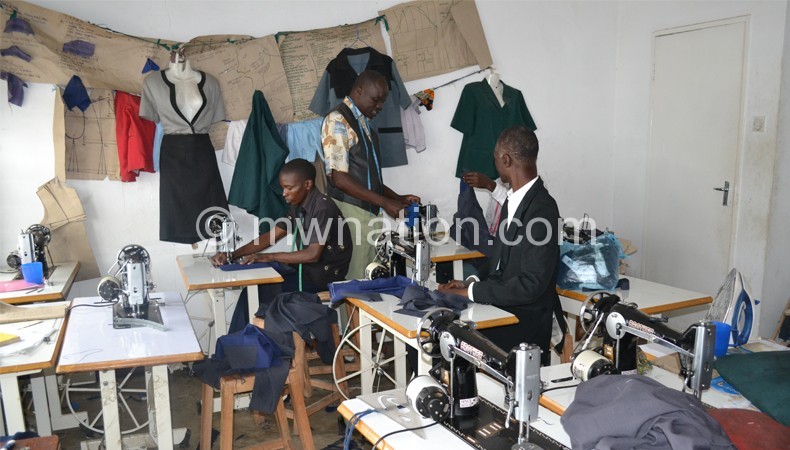Reducing unemployment with skills
**Feature written by JABULANI KAMNGOYA
A short man with a few turfs of grey beard sits with a sewing machine in a design and tailoring class full of young girls and boys. He works with a resolute serenity with his quick hands and sharp eyes that never miss inserting a thread through a needle’s eye.
Kananji Kalomba has been doing this for over 20 years, but he does not seem to show the slightest frailty.
At 66, one would think he is too old for a basic tailoring class. But Kalomba, from Mphonde Village in Dedza surprised many when he slipped into a class of students fit to be his grandchildren.
Ntchetsa Community Skills Development Centre (CSDC) is now his hope where he and 19 others are getting tailoring skills to improve their economic stand.

“Certificates are for the youth. And our development is very slow because we focus on getting the certificates and not necessarily mastering the skills,” he says, adding: “This is why when most people get the certificate, they wait for a job. But I will use the skills in my business.”
Kalomba says he started tailoring as a business in the 1980’s.
“I only had basic skills. But now an opportunity has come for me to polish up my skills,” says Kalomba, while quietly pulling a cloth from a box and putting it through his sewing machine.
He says the tailoring business has changed drastically over the years.
“My sales were constantly declining and I needed a boost. I have seen that people’s preferences of clothing style have changed as well and I had to adapt,” adds Kalomba.
“I can now make new designs and my products are more marketable than in the past,” he says.
On the other hand, Target Phiri, 24, seems ready to push the limits of the basic education he has had from his village’s skills centre established by Technical Education, Vocational and Entrepreneurship Training Authority (Teveta).
Phiri, from Kawamba Village in Kasungu was saved by the Teveta community training programmes after his failure to access college education threatened his success in future.
He registered at Kawamba CSDC for tinsmith training.
“I did not make it to college after finishing Form Four three years ago. I saw this chance and enrolled. Now I run a tinsmith business. At first I wanted to seek employment, but my business is gaining ground.
“Now I have also opened a barbershop which is being manned by my friend. I can now support myself and those around me such as my old father,” said Phiri.
While he works on metal outside, his customers watch television waiting for their turn to cut their hair.
“I am making progress,” he says.
In his area, the number of youths trained by Teveta will soon hit 100.
Teveta senior training programmes specialist , in the Central Region Jordan Banda says the informal sector, to which the majority of the country’s population belongs, is not progressing much due to lack of skills and trainings.
“We want to build the trainees’ capacity so that they are able to engage in meaningful income-generating activities. We want people in hard-to-reach areas to be self-reliant by giving them the right skills and knowledge,” says Banda.
He says the programmes are cost-effective for the people and implementers alike.
“The people learn at community centres in their villages and do not travel long distances to learn. This also allows them to learn while attending to other businesses,” said Banda.
He adds that the courses do not have to have rigid prerequisite qualifications like Malawi School Certificate of Education (MSCE) for instance.
“We need their interest and focus to succeed,” he says.
Teveta regional service centre manager for Central Region Victor Luwambala says they only introduce programmes that are needed in an area.
“We never impose already crafted trainings on the people. We only offer assistance where they cannot manage. For instance, we provide equipment for training and pay salaries of the trainers,” he says.
Luwambala says the programme is currently running in Mchinji, Kasungu, Nkhotakota, Salima, Dedza; and will soon go to Lilongwe rural and urban.
He says Tevet has partnered with World Bank, which is financing the programme.
Some have been trained in carpentry, tailoring, bakery, tinsmith and electrical installation among other trades in the community centres.
In Nkhotakota, 108 youths have graduated. Teveta says about 5 000 out-of-school youths and interested adults would benefit in Central Region.
According to Teveta, CSDCs are Teveta-listed community-owned institutions with specified infrastructure that provide trainings and are recognised by the local council.





